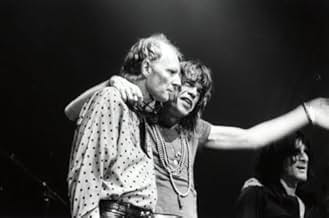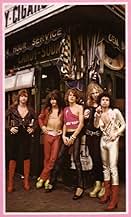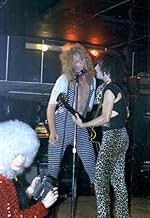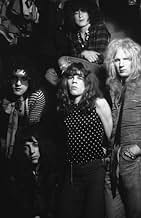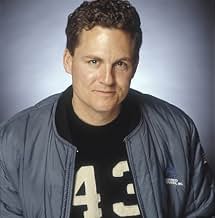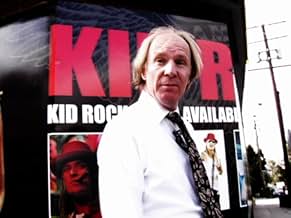NOTE IMDb
7,7/10
1,9 k
MA NOTE
Ajouter une intrigue dans votre langueA recovering alcoholic and recently converted Mormon, Arthur "Killer" Kane, of the rock band The New York Dolls, is given a chance at reuniting with his band after 30 years.A recovering alcoholic and recently converted Mormon, Arthur "Killer" Kane, of the rock band The New York Dolls, is given a chance at reuniting with his band after 30 years.A recovering alcoholic and recently converted Mormon, Arthur "Killer" Kane, of the rock band The New York Dolls, is given a chance at reuniting with his band after 30 years.
- Récompenses
- 2 nominations au total
Commentaire à la une
Religious conversion stories are often dreadfully boring to all but fellow believers. Too often they are tales of interesting lives of despair lifted by a higher power to lives of less-than-fascinating virtue. I don't mean to imply criticism of epiphanies in any form. But it is an axiom of sectarian movie marketing that the religiously inclined will tolerate the blandest of cinema if packaged faithfully, and that's often what they get.
I was expecting more of the same when I heard about New York Doll at Sundance last year. This is the story of Arthur "Killer" Kane, bass player for the legendary New York Dolls rock 'n roll band of the '70's. For those that didn't follow the pop music scene back then, the Dolls were one of the hardest-edged, most controversial groups of their era. Forerunners of the punk movement, they paraded in drag and set the stage for later bands such as The Sex Pistols, The B-52's and The Clash.
Like so many other punk bands, the Dolls fell victim to excesses and addiction. Kane, known for his "killer" bass lines, was sometimes too drunk to perform, and would simply stand on-stage with a bass around his neck while a roadie filled in for him. (However, since Kane was known for his wooden posture on stage, it may have been hard to tell whether he was really playing or not!) After a meteoric four years, the Dolls dissolved and Kane drifted into alcoholism and obscurity, only reclaiming his life with his 1989 conversion to Mormonism and work at the LDS Family History Center in Los Angeles.
But despite his discovered spirituality, he always harbored the desire for the band to reunite and play again. His seemingly impossible dream was realized in 2004, when Morrissey (The Smiths) engineered a reunion of the Dolls for the London Meltdown Festival.
Director Greg Whitely crafts a warm and engaging story set to this strange juxtaposition. Kane is an intriguing personalitysimple, friendly and honest, he talks wistfully of his days of drugs, sex and rock and roll ("some of my fondest memories," he says) yet never wavers from his commitment to his Mormon faith. Interspersed in the reunion story are thoughts on Kane from Mormon co-workers and religious leaders as well as punk rockers Morrissey, Sir Bob Geldof (of Boomtown Rats and then Live Aid fame), Chrissie Hynde of The Pretenders, Iggy Pop and others.
But the drama is the reunion itself. Two of the Dolls died in the early 90's, leaving Kane, guitarist Sylvain Sylvain and singer David Johansen. Of the three, Johansen found the most success post-Dolls, both as an actor as well as singing under the alter-ego Buster Poindexter (remember "Hot, Hot, Hot"?). Kane resented Johansen for nearly three decades, and the tension is palpable when the singer arrives (over a day late) for rehearsals. While time and hard living have clearly slowed, humbled and mellowed Kane, in contrast Johansen comes across like Mick Jaggera youthful glam rocker in a craggy-faced, 50-year-old body. While Kane appears non-plussed by the experience, Johansen is still energized by the spotlight.
What is truly touching is how they resolve their differences, rekindle their relationship and develop mutual respect. Kane tries to explain his religion to a bemused Johansen, including the Mormon principal of tithing"It's like an agent's fee," he explains. "It's only 10 percent. It's a pretty good deal." New York Doll is a well-executed and compassionate documentary that will warm the hearts of faithful and heathen alike. Whitely clearly cares deeply for Arthur Kane, who seems to have touched the lives of everyoneeven those from the Dolls' era. And it's impossible not to like Kane, who is so sincerely grateful for his good fortunehis past, his faith and his chance to once again be a New York Doll. This is a tender story with a bittersweet ending, which I won't give away. I will tell you to keep watching as the credits roll, because there's a song you won't want to miss.
I was expecting more of the same when I heard about New York Doll at Sundance last year. This is the story of Arthur "Killer" Kane, bass player for the legendary New York Dolls rock 'n roll band of the '70's. For those that didn't follow the pop music scene back then, the Dolls were one of the hardest-edged, most controversial groups of their era. Forerunners of the punk movement, they paraded in drag and set the stage for later bands such as The Sex Pistols, The B-52's and The Clash.
Like so many other punk bands, the Dolls fell victim to excesses and addiction. Kane, known for his "killer" bass lines, was sometimes too drunk to perform, and would simply stand on-stage with a bass around his neck while a roadie filled in for him. (However, since Kane was known for his wooden posture on stage, it may have been hard to tell whether he was really playing or not!) After a meteoric four years, the Dolls dissolved and Kane drifted into alcoholism and obscurity, only reclaiming his life with his 1989 conversion to Mormonism and work at the LDS Family History Center in Los Angeles.
But despite his discovered spirituality, he always harbored the desire for the band to reunite and play again. His seemingly impossible dream was realized in 2004, when Morrissey (The Smiths) engineered a reunion of the Dolls for the London Meltdown Festival.
Director Greg Whitely crafts a warm and engaging story set to this strange juxtaposition. Kane is an intriguing personalitysimple, friendly and honest, he talks wistfully of his days of drugs, sex and rock and roll ("some of my fondest memories," he says) yet never wavers from his commitment to his Mormon faith. Interspersed in the reunion story are thoughts on Kane from Mormon co-workers and religious leaders as well as punk rockers Morrissey, Sir Bob Geldof (of Boomtown Rats and then Live Aid fame), Chrissie Hynde of The Pretenders, Iggy Pop and others.
But the drama is the reunion itself. Two of the Dolls died in the early 90's, leaving Kane, guitarist Sylvain Sylvain and singer David Johansen. Of the three, Johansen found the most success post-Dolls, both as an actor as well as singing under the alter-ego Buster Poindexter (remember "Hot, Hot, Hot"?). Kane resented Johansen for nearly three decades, and the tension is palpable when the singer arrives (over a day late) for rehearsals. While time and hard living have clearly slowed, humbled and mellowed Kane, in contrast Johansen comes across like Mick Jaggera youthful glam rocker in a craggy-faced, 50-year-old body. While Kane appears non-plussed by the experience, Johansen is still energized by the spotlight.
What is truly touching is how they resolve their differences, rekindle their relationship and develop mutual respect. Kane tries to explain his religion to a bemused Johansen, including the Mormon principal of tithing"It's like an agent's fee," he explains. "It's only 10 percent. It's a pretty good deal." New York Doll is a well-executed and compassionate documentary that will warm the hearts of faithful and heathen alike. Whitely clearly cares deeply for Arthur Kane, who seems to have touched the lives of everyoneeven those from the Dolls' era. And it's impossible not to like Kane, who is so sincerely grateful for his good fortunehis past, his faith and his chance to once again be a New York Doll. This is a tender story with a bittersweet ending, which I won't give away. I will tell you to keep watching as the credits roll, because there's a song you won't want to miss.
Histoire
Meilleurs choix
Connectez-vous pour évaluer et suivre la liste de favoris afin de recevoir des recommandations personnalisées
- How long is New York Doll?Alimenté par Alexa
Détails
Box-office
- Montant brut aux États-Unis et au Canada
- 219 672 $US
- Week-end de sortie aux États-Unis et au Canada
- 17 583 $US
- 30 oct. 2005
- Montant brut mondial
- 237 136 $US
- Durée1 heure 15 minutes
- Couleur
- Rapport de forme
- 1.78 : 1
Contribuer à cette page
Suggérer une modification ou ajouter du contenu manquant

Lacune principale
By what name was New York Doll (2005) officially released in Canada in English?
Répondre









